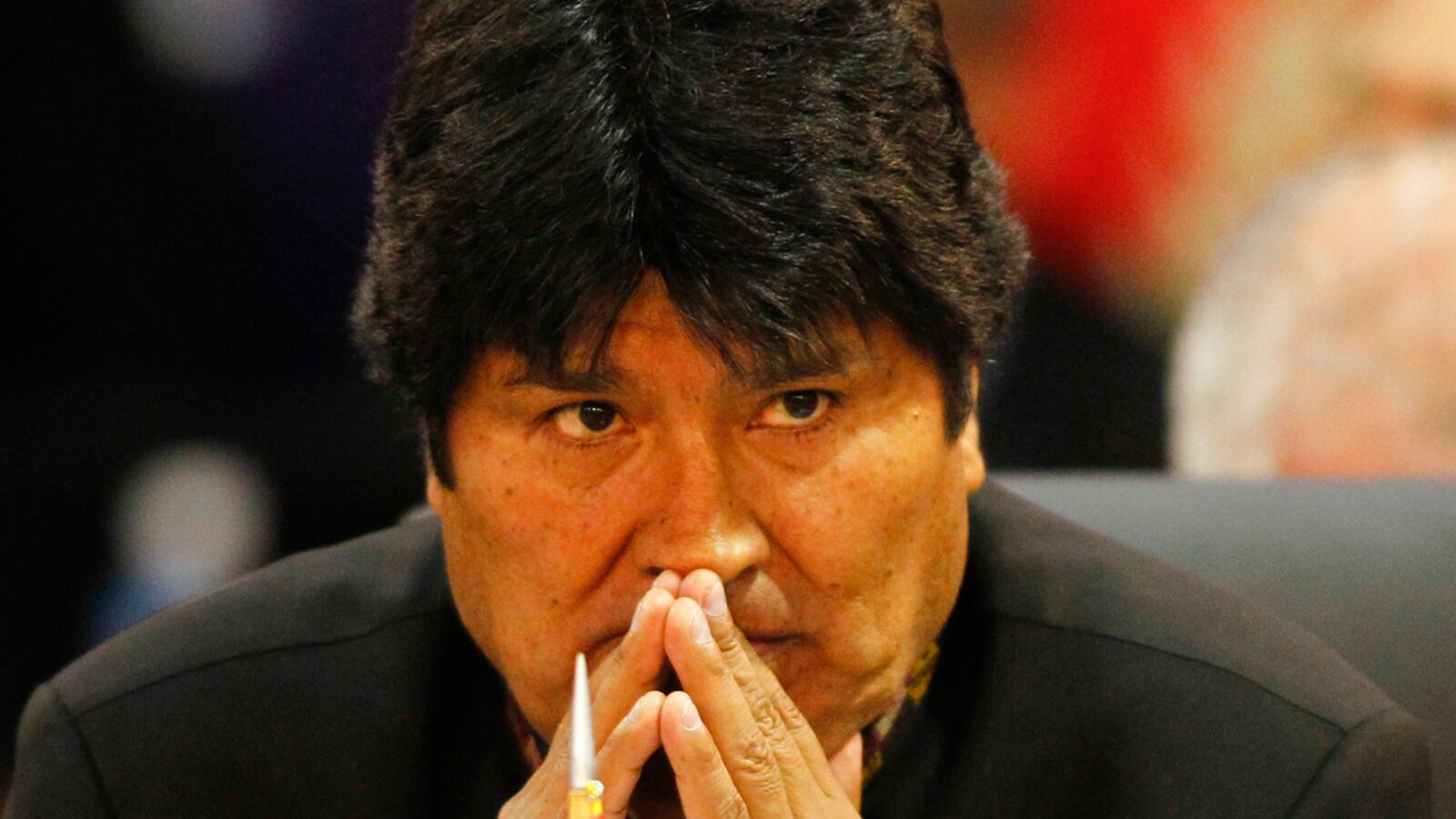Ask higher-ups in Bolivia about the country’s political prisoners and you’ll get the cookie-cutter answer: “No hay,” which is Spanish for "There aren’t any." So says the government of Evo Morales, the nation’s leader, twice elected by a comfortable majority, in open, democratic, and clean elections. Hence the official disclaimer that all those behind bars in Bolivia are common criminals—and, punto final, or period.
But democracy in the age of Morales, a lesser franchise of Venezuelan President Hugo Chávez’s troubled brand of “21st Century Socialism,” has always been a little different.
Consider the case of Juan Antonio Morales. A former central bank president, Morales, who is unrelated to the president, was placed under house arrest on Sept. 7. Since then, he has been forbidden to leave his home in La Paz, whether to lecture at the Catholic University, go to the dentist, or walk his pet dog, except upon written orders by a judge. Lately the 69-year-old economist spends his days reading in his pleasant courtyard, pedaling a stationary bike, and wondering what has become of the promise of a fair and equitable “plurinational” democracy.
His crime? Well, here the tale gets lost in the Andean mist, a sign perhaps that magical realism, the fantastical genre of fiction that skewered Latin American tyrants and strongmen, is alive and kicking in the age of the “Bolivarian” revolution.

First, though, a bit of biography. Juan Antonio Morales presided over the Bolivian central bank from 1995 to 2006. He became not just the longest-sitting monetary authority in the hemisphere after Alan Greenspan, but also a pillar of stability and probity in a country accustomed to neither. In his 11 years at the Bolivian fed, nine finance ministers rose and fell. The acclaimed Brazilian former central-bank governor, Armínio Fraga, calls Morales a “serious and respected professional,” while David Atkinson, who served five and a half years as Inter-American Development Bank representative in La Paz, calls him a “man of impeccable ethics.”
A career technocrat and a lifelong academic, Morales had little use for politics. His brief in public service was to restore Bolivia to fiscal sanity, retrieving the country from a jag of hyperinflation not seen since the Weimar Republic. I recall in the 1980s paying a hotel bill with a shopping bag of Bolivian pesos, and once saw peasants in the Chapare, the nation’s cocaine belt, weigh bricks of bills instead of counting them. By the end of Morales’s mandate, inflation was below 5 percent a year. He was named Latin America’s central banker of the year by Emerging Markets magazine, obligatory reading at the World Bank and the International Monetary Fund.
Now for the rap sheet. Morales has yet to be charged with a crime, but he has been hit with a vague, but quite public, barrage of accusations ranging from malfeasance to pocketing public money to conspiring against the nation. His prime “offense” was to have earned an “illegal” bonus of around $1,000 above his official paycheck of $5,000 a month.
In fact, there was nothing irregular about it. In the inflationary '90s, the government was forced to pay modest “pluses” to its top bureaucrats to keep them from defecting to the private sector. But in 2010, Evo Morales’s ruling party, the Movement Towards Socialism, steamrolled congress into new legislation that retroactively converted routine payroll perks into illicit gains. Overnight, Juan Antonio Morales went from wonk to bandit.
And there was more. More recently, auditors from the ominously titled Ministry for Transparency and Anticorruption are questioning Morales on another, far more serious charge. At issue is an emergency loan the central bank made to Citibank to salvage a Bolivian mortgage bank that was drowning in bad debts. The operation was a success. Citibank restructured the Banco Hipotecário, and paid back the $43 million loan four years before it was due. But under new laws, the whole operation was retrofitted as a plot against the state and Juan Antonio Morales as a public enemy.
Such is the reverse alchemy of the Bolivarian revolution. At a pen stroke, lawful acts of the recent past have become crimes of corruption, while yesterday’s best practices are today’s white-collar conspiracy against flag and country. For those familiar with Fidel Castro’s Cuba or the demi-dictatorship of Venezuela, this is a familiar tale. But it is jarring in Bolivia, where the rise of a young, charismatic, indigenous leader to president was hailed as a watershed in this desperately poor and ethnically fractured land.
“What saddens me is that the current administration had a golden opportunity to bring greater justice to some very critical social and ethnic issues in Bolivia,” says Atkinson. “Instead, the country has become more divided.”
By reinventing the past, the Morales government also has found a tool to convert dissenters into public enemies, all with the varnish of justice.
Today, four Bolivian ex-presidents face criminal charges, one of them, Eduardo Rodriguez Velzé, for alleged treason. Former governors and mayors of La Paz, Beni, Cochabamba, Santa Cruz, and Tarija also are defending their public records in court, while onetime Pando state governor Leopoldo Fernandéz, who has not been tried, has been behind bars for three years. So is the entire military high command of former president Gonzalo Sánchez de Lozada, whom the Morales government sought to extradite for “genocide” from the United States. The U.S. court turned that down.
In a way, Juan Antonio Morales has gotten off fairly easily. What these onetime public figures have in common are the unpardonable acts of having served administrations prior to that of Evo Morales and of expressing their own ideas about politics and government. In the new Bolivia, that is enough to make them foes of the president and so, by the inverted Bolivarian alchemy, enemies of the state. Call them political prisoners at your own risk.






